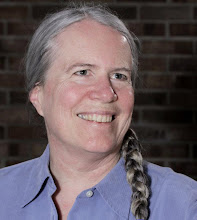Feminism saved me when I was young. I grew up with abuse from my mother and grandmother, and my reaction was not to want to be a woman. By the time I got to college, planning to major in astrophysics, my way of being was to be one of the guys. Feminism saved me from being totally male-identified--it gave me a way to accept being a woman without becoming my mother or grandmother.
As a teenager, I didn't expect that I would ever marry or have children. I married only in my early 30s, with the understanding that John and I would equally share household tasks and with a prenuptual agreement (which my lawyer now tells me will provide some protection for my assets if we need to get John onto Medicaid). So into order to find myself in this new challenge I want to think about whether there is a feminist approach to caregiving.
I did a little web searching on the topic. I may just have to track down a special issue of a journal on Fundamentals of Feminist Gerontology. The trouble is, the focus is likely to all be on daughters caring for mothers. I found one article that argues that too many studies focus on how women put their own health at risk while caregiving and asserts there should be more focus on the autonomy of older women rather than their role as caregivers. Not what I am looking for.
There is certainly need for a feminist call for change in the system to give caregivers more choices. I read a blog by a gerontological psychiatrist in England and government funding of long-term care makes a big difference. If Medicare covered long-term care for people with dementia I would be in a very different situation. Even leaving aside the issue of how to pay for it, in a rural area like the one I am in nursing home care for people with dementia is way behind best practices. I'm guessing I may end up keeping John at home because nearby facilities won't be able to handle the behavioral challenges constructively. Feminism tells us that we need social solutions to problems like caring for people with dementia, not just private solutions.
But there are other feminist issues besides having choices. Caregiving can be a way of asserting identity for minorities. For wives who are caregivers to their husbands, caregiving is an odd change in roles where we have increasing power over our husbands, want it or not. I feel that already when I go with John to a doctor's appointment and the doctor listens to me. To claim to know what is best for another person is a mix of power and burden. The issue of identity and the issue of power come together when I increasingly become the sole decisionmaker and choose to handle things my way. In a posting in an email group today, a woman wrote that she was going to ignore a doctor's advice on a particular issue because she knew more about her husband than the doctor did.
The interesting question would be what would we do if we had a choice of caregiving at home or a facility that followed the scientific best practices? Would we assert that local knowledge--our personal knowledge of what will work with our spouse--is better than standardized best practice? I think many people in the email group would. Is that because we are socialized to feel responsible for providing care? Or is it a rejection of rationalization and the scientific approach, instead claiming the value of our local knowledge and culture?
I don't know if any of this makes sense yet, but it feels like something that is important for me to explore.
Monday, July 07, 2008
Subscribe to:
Post Comments (Atom)


No comments:
Post a Comment